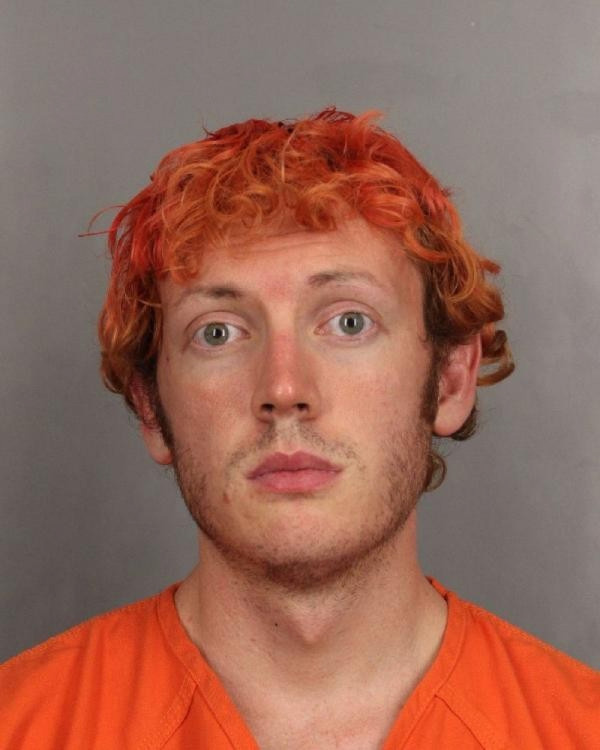Colorado Shooting: Will James Holmes Plead Insanity? Experts Say It Is The Alleged Killer's 'Only Possible Defense'

James Holmes, the man accused of killing 12 people and wounding 58 others in an Aurora, Colorado movie theater is scheduled to appear in court on Monday, July 30, where he will be formally charged with the crime. He is also being held in connection with the ensuing discovery of active explosive material in his apartment, which investigators believe he rigged before leaving for the Century Aurora 16 multiplex, where the shootings took place.
Holmes gave the world their first live action view of himself last week when the 24-year-old former doctoral candidate appeared in court for the first time. With his hair dyed a devilish shade of orange and a dazed and confused look on his face, the man who remained silent for the entire hearing gave the impression of a sick and deranged individual.
In the investigation following the attacks, much was learned about James Holmes and his life before the Colorado shooting. The 24-year-old who police say opened fire in a crowded movie theater was a doctoral student at the University of Colorado School of Medicine in Aurora. Holmes was in the school's doctoral neuroscience program, but was in the process of withdrawing at the time of the shooting.
In the fall of 2006, he entered the University of California, Riverside, graduating with a B.S. in neuroscience in the spring of 2010. "Academically, he was at the top of the top," Chancellor Timothy P. White told reporters Friday.
Holmes was a scholarship student who graduated with highest honors, said White, and he had an "obvious intellectual capacity."
In addition, a court document filed Friday revealed another fact about Holmes that might seem contradictory to the fore mentioned background which describes the now infamous killer. The document filed reveals that James Holmes was a patient of a University of Colorado psychiatrist before the attack.
The discovery was in a request by Holmes for authorities to immediately hand over a package he sent to Dr. Lynne Fenton at the university's Anschutz Medical Campus, CNN reports.
According to Holmes' request, the package seized by authorities under a July 23 search warrant was a protected communication.
"The materials contained in that package include communications from Mr. Holmes to Dr. Fenton that Mr. Holmes asserts are privileged," said the document filed by public defenders representing Holmes. "Mr. Holmes was a psychiatric patient of Dr. Fenton, and his communications with her are protected."
Several other media outlets besides CNN reported that the package contained a notebook with descriptions of an attack, but Arapahoe County District Attorney Carol Chambers said in court papers that the parcel hadn't been opened by the time the "inaccurate" news reports appeared.
"This is not a whodunit," Craig Silverman, a former chief deputy district attorney in Denver told CSM. "The only possible defense is insanity."
While all 50 states have different interpretations of the uncommon defense, Colorado law indicates that defendants are not legally liable for their acts if their minds are so "diseased" that they cannot distinguish between right and wrong. However, the law warns that "care should be taken not to confuse such mental disease or defect with moral obliquity, mental depravity, or passion growing out of anger, revenge, hatred, or other motives, and kindred evil conditions."
According to many experts familiar with the case, Holmes ultimately could enter an insanity plea after prosecutors file multiple counts of attempted first-degree murder and other charges against Holmes.
Sam Kamin, a law professor at the University of Denver, told CSM there is "pronounced" evidence that the shooting was premeditated, which would seem to make an insanity defense difficult. "But," he said, "the things that we don't know are what this case is going to hinge on, and that's his mental state."
According to police, Holmes allegedly began stockpiling gear for his assault around four months ago. Authorities say he bought his weapons in May and June.
If the public defenders in Holmes's corner argue he is not mentally competent to stand trial, but cannot convince the court that he is mentally incompetent, they can and most likely will try to stave off a possible death penalty by arguing he is mentally ill. Prosecutors will decide whether to seek the death penalty in the coming weeks.
© Copyright IBTimes 2024. All rights reserved.






















